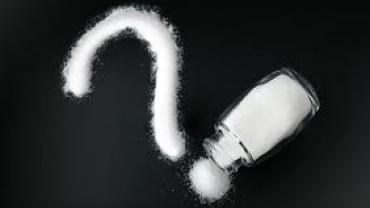
Low carb? Low fat? Whole grains? Paleo? With so much conflicting dietary guidance coming from news outlets and medical professionals alike it’s no wonder patients are confused. From one day to the next different foods and nutrients are being alternately celebrated and demonized. A case in point is sodium.
The U.S. Food and Drug Administration (FDA) recently proposed voluntary reductions in salt content of processed foods and restaurant dishes. However a study out of McMaster University published in The Lancet concluded that low sodium intake is associated with “increased risk of cardiovascular events and death” in individuals with or without hypertension—meaning even people with high blood pressure may not benefit from drastically reducing sodium intake and low salt diets may also adversely affect those who are otherwise healthy.
The FDA recommendations are based on the idea that the majority of Americans’ salt intake comes from foods to which salt has been added before it reaches the table rather than added via the salt shaker at home. So in order to make any significant headway in reducing sodium intake in the general population efforts to decrease added salt should primarily focus on packaged/processed foods and meals served at restaurants.
However a growing body of research is questioning the validity of the need to encourage dietary sodium restriction across the board at all. The Institute of Medicine (IOM) of the National Academy of Sciences reported that “links between sodium consumption and health outcomes support recommendations to lower sodium intake from the very high levels some Americans consume now but evidence from these studies does not support reduction in sodium intake to below 2300 mg per day.” So while a very high sodium intake may be problematic going too far in the opposite direction may be just as detrimental to overall health. Moreover even among groups who are typically specifically advised to reduce salt intake—such as type-2 diabetics and those with heart disease—this recommendation may not be necessary.
According to the IOM report: “While studies on health outcomes provide some evidence for adverse health effects of low sodium intake (in ranges approximating 1500 to 2300 mg daily) among those with diabetes kidney disease or heart disease the evidence on both the benefit and harm is not strong enough to indicate that these subgroups should be treated differently from the general U.S. population. Thus the evidence on direct health outcomes does not support recommendations to lower sodium intake within these subgroups to or even below 1500 mg daily.” (Emphasis added.) The McMaster study emphasizes that that there is “a U-shaped association between urinary sodium excretion and cardiovascular disease events and mortality”—again too much or too little may be harmful for hypertensives and those with normal blood pressure.
Indeed it may be that chronically elevated insulin plays a greater role in hypertension and other aspects of blood vessel function and cardiovascular disease than dietary sodium does. Some researchers have even referred to salt as “the wrong white crystals” pointing to evidence indicating that with regard to hypertension and cardio-metabolic disease the focus should be on sugar rather than salt.
Aside from sodium and sugar another potential contributor to the etiology of hypertension that receives insufficient attention is inadequate potassium intake. Just as with calcium/magnesium and copper/iron/zinc minerals must be properly balanced in the body. So even in the context of a “high” sodium intake it may not be the sodium per se that is problematic but rather the coupling of a relatively high sodium intake with insufficient potassium. The good news is leafy greens and other vegetables are good sources of potassium and increasing intake of these foods seems to be one of the only recommendations the various warring nutritional camps agree on.
As always context is key. Who is the patient and what is the goal? Just as recommendations for across-the-board consumption of low-fat diets are beginning to go the way of the dinosaurs population-wide guidelines for low sodium intake may soon follow suit. According to the McMaster study “Compared with moderate sodium intake high sodium intake is associated with an increased risk of cardiovascular events and death in hypertensive populations” but there was “no association in normotensive individuals.”
It’s difficult enough for healthcare professionals to make sense of things when one government organization emphasizes the nuances and unintended—and potentially harmful—consequences of across-the-board recommendations while a different organization proceeds full-steam ahead in a different direction. Imagine how the public feels. It’s a wonder more people aren’t presenting with whiplash!